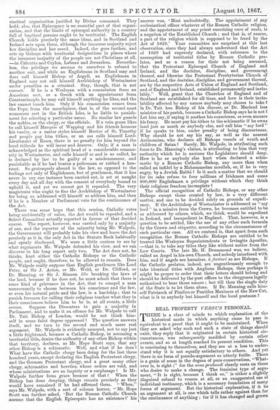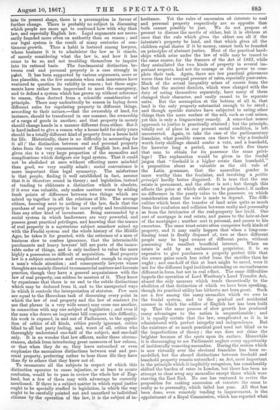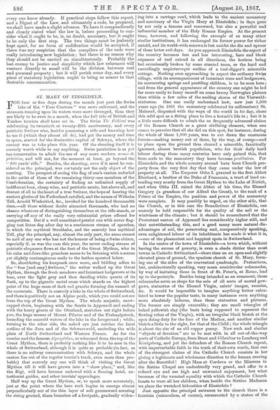REAL PROPERTY VERSUS PERSONAL.
THEREE is a class of minds to which explanation of the mode in which anything came to pass is equivalent to a proof that it ought to be maintained. When they are asked why such and such a state of things should exist, they reply that it originated in certain historical cir- cumstances, was subsequently modified by certain other events, and so at length reached its present condition. This is convincing to themselves, and they are at a loss to under-. stand why it is not equally satisfactory to others. And yet there is no form of pseudo-argument so utterly futile. There is a grain of sense in the dogma of pure conservatism, "What- ever is, is right ;" for the onus probandi clearly rests on those who desire to make a change. The feminine type of argu- ment, " It is right, because I think so," is either a slightly disguised refusal to reason at all, or an exaggerated use of individual testimony, which is a necessary foundation of many forms of argument. But the historical explanation, if it be an argument at all, is one which tells rather against than for the continuance of anything ; for if it has changed and grown
into its present shape, there is a presumption in favour of further change. There is probably no subject in discussing which people are more apt to confound how with why than law, and especially English law. Legal arguments are neces- sarily founded more often on authority than on reason ; and our legal system is the result of many centuries of con- tinuous growth. Thus a habit is fostered among lawyers, whose business it is to administer the law as it stands, of merely considering what the law is, and how it has come to be so, and not troubling themselves to inquire
into its rational basis. The fundamental distinction be- tween real and personal property is a case strongly in pant. It has been supported by various arguments, more or less plausible, on the few occasions when rash innovators have ventured to question its validity in reason ; but these argu- ments have rather been improvised to meet the emergency, and to defend a system which has grown up without reference to reason, than derived from a scientific consideration of principle. There may undoubtedly be reason in laying down different rules for regulating property in different things, according to- their nature,—that the ownership of land, for instance, should be transferred in one manner, the ownership of a cargo of goods in another, and that property in money should change hands in a manner different from either. But it is hard indeed to give a reason why a house held for sixty years should be a totally different kind of property from a house held for life. Historically, there is no difficulty in accounting for it all ; the distinction between real and personal property dates from the very commencement of English law, and has given rise to a very large proportion of the anomalies and complications which disfigure our legal system. That it could not be abolished at once without effecting more mischief than good, we very readily admit ; social convenience is more important than legal symmetry. The misfortune is that people, finding it well established in fact, assume that it is therefore sound in theory ; and legislation, instead of tending to obliterate a distinction which is obsolete, if it ever was valuable, only makes matters worse by adding fresh points of difference between two things which are mixed up together in all the relations of life. The average citizen, knowing next to nothing of the law, finds that the purchase of real property is far more costly and troublesome than any other kind of investment. Being surrounded by a social system in which landowners are very powerful, and possess great practical privileges, and knowing that the tenure of real property is a mysterious subject somehow mixed up with the Feudal system and the whole history of the Middle Ages, he takes it for granted, with the reticence of a man of business slow to confess ignorance, that the interminable parchments and heavy lawyers' bill are parts of the immu- table order of things, and is only inclined to value the more highly a possession so difficult of acquisition. Real property law is a subject extensive and complicated enough to engross a man's whole attention ; and consequently lawyers whose thoughts are mainly directed to commercial matters and forensic practice, though they have a general acquaintance with the law of real property, can seldom be masters of it. They know by experience that there is no end to the subtle distinctions which may be deduced from it, and to the unexpected ways in which it controls the interpretation of statutes. Few men are equal to the Herculean task of discerning every point in which the law of real property and the law of contract (to use that phrase in a very wide sense) may cross one another, in connection with any one subject of legislation ; and even if
the man who draws an important bill conquers this difficulty, his work is exposed, in and out of Parliament, to the opposi- tion of critics of all kinds, critics purely ignorant, critics blind to all but party feeling, and, worst of all, critics who thoroughly understand one-half of the subject, and one-half only. It is no wonder that law officers, under these circum- stances, shrink from introducing great measures of law reform, or that when they do so, they leave untouched or even emphasize the anomalous distinctions between real and per- sonal property, preferring rather to bear those ills they have than fly to others that they know not of. To enumerate all the subjects in respect of which this distinction operates to cause injustice, or at least to create confusion, would be to pass in review the whole law of Eng- land, but a few of them may with advantage be cursorily mentioned. If there is a subject matter in which equal justice ought to be specially studied in legislation, in which the way ought to be carefully pointed out and smoothed to individual citizens by the operation of the law, it is the subject of in- heritance. Yet the rules of succession ab intestato to real and personal property respectively are so opposite that both cannot possibly be just. We do not propose at present to discuss the merits of either, but it is obvious at once that the rule which gives the eldest son all if the intestate's property be land, and that which gives all the children equal shares if it be money, cannot both be founded on principles of abstract justice. Most of the practical hard- ships which arise under the law of wills may be traced to the same source, for the framers of the Act of 1837, while they assimilated the two kinds of property in several im- portant respects, had not the courage or the power to com- plete their task. Again, there are few practical grievances worse than the unequal pressure of rates, especially poor-rates. Much of the actual inequality arises of course from the- fact that the ancient districts, which were charged with the duty of rating themselves separately, have many of them changed their character, and really ceased to be separate units. But the assumption at the bottom of all is, that land is the only property substantial enough to be rated ; and though specific statutes have subjected to rating other things than the mere surface of the soil, such as coal mines, yet this is only a fragmentary remedy. A somewhat nearer approach to justice is practically attained ; but the principle, totally out of place in our present social condition, is left uncorrected. Again, to take the case of the parliamentary franchise, what possible reason can there be why a freehold worth forty shillings should confer a vote, and a leasehold, for however long a period, must be worth five times that sum to obtain for its possessor the same privi- lege ? The explanation would be given in the feudal jargon that " freehold is a higher estate than leasehold," a proposition about as valuable as the old rule of the Latin grammar, that the masculine gender is more worthy than the feminine, and involving a petitio principii hardly better disguised. It is true that the one estate is permanent, and the other is not ; but though this affects the price at which either can be purchased, it makes no difference in the yearly value to the possessor, on which consideration alone the vote is made to depend. The diffi- culties which beset the transfer of land arise quite as much from the confusion and collision between realty and personalty as from the intricacies of the real-property law itself. One sort of mortgage is real estate, and passes to the heir-at-law of the mortgagee ; another sort is personal, and passes to his. executors. The same trust estate often comprises both kinds of property, and it may easily happen that when a long-con- tinuing trust is finally disposed of, two or three different people may be legal owners of different parts, without
possessing the smallest beneficial interest. When an estate is sold by an embarrassed proprietor, it is so expensive to give purchasers a properly perfect title that the owner gains much less relief from the sacrifice than he ought ; and one-half of this at least might be saved, were it not for the different legal incidents attending on encumbrances different in form, but not in real effect. The same difficulties impede the operation of Lord Westbury's Land Transfer Act, almost the only measure which tends theoretically to the abolition of that distinction of which we have been speaking, though its practical utility has hitherto not been great. Such are a few among the many anomalies which we owe to the feudal system, and to the gradual and accidental manner in which the edifice of English law has been built up. That the same process of slow growth has produced many advantages to the nation is unquestionable ; and it is equally certain that the law, complicated as it is, is administered with perfect integrity and independence. But the existence of so much practical good need not blind us to the imperfections of theory ; the sun does not shine the brighter because of the spots upon its surface. Meanwhile it is discouraging to see. Parliament neglect every opportunity of incidentally removing anomalies. During the session which is now virtually over the electoral franchise has been re- modelled, but the absurd distinctions between freehold and leasehold property remain untouched ; an Act, most important in the principle which it implicitly recognizes, has considerably shifted the burden of rates in London, but there has been no attempt to clear away any anomalies except those which were starving the East End. No one has ventured to revive the proposition for making succession ab intestato the same to realty as to personalty, which failed last year. All that has been done, even remotely tending to improvement, is the appointment of a Royal Commission, which has reported what every one knew already. If practical steps follow this report, and a Digest of the Law, and ultimately a code, be prepared, we shall have made a slight advance. To have it compendiously and clearly stated what the law is, before proceeding to con- sider what it ought to be, is, no doubt, necessary, but it ought to be only the first step. The two things must be jealously kept apart, for no form of codification would be accepted, if there was any suspicion that the compilers of the code were really introducing new legislation ; but there is no reason why they should not be carried on simultaneously. Probably the last enemy to justice and simplicity which law reformers will venture directly to assail will be the division between real and personal property ; but it will perish some day, and every piece of statutory legislation ought to bring us nearer to that desirable consummation.
































 Previous page
Previous page